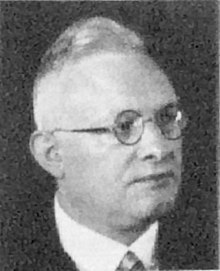Karl Schmitz (politician, 1881)
Karl Schmitz (born February 17, 1881 in Aachen , † January 2, 1955 in Duisburg ) was a German politician (center).
Live and act
After attending elementary school in Aachen, Schmitz learned the lathe trade. In addition, he attended the advanced training school in Aachen. Later he also completed a few economics courses at the Volksverein for Catholic Germany in Mönchengladbach .
Schmitz was politically active early on in the Christian trade unions and at the latest during the Weimar Republic in the Catholic Center Party . In 1905 he became the full-time district secretary of the Christian Metalworkers' Association for the Rhineland in Cologne . In 1919 he was appointed to the main management of the Christian Metalworkers' Association in Duisburg . A year later he became 2nd chairman of the Christian Metalworkers Association. In the same year he reached the high point of his career as a trade unionist when he was appointed chairman of the General Association of Christian Trade Unions in Germany. He was also a member of the Franco-German Economic Commission.
In the Reichstag election of March 1933 he was elected to the eighth Reichstag of the republic as a representative of constituency 23 (Düsseldorf West) . Just four months later, Schmitz resigned his seat and left parliament again. Schmitz's mandate was then continued by Heinrich van de Sandt from August 1933 until the end of the electoral term . The parliamentary events in which he was involved during his short term as a member of parliament included the vote on the Enabling Act in March 1933, which was finally passed with his vote .
After Schmitz had also lost his position as chairman of the association in 1933 - probably under pressure from the National Socialists - he ran his own textile business from 1934 to 1944.
Schmitz was marginally involved in the coup d'état of July 20, 1944 through contacts with Wilhelm Elfes .
Fonts
- The worker's adviser , Duisburg s. l. [1914].
- Nationalization of the trip iron industry or social economy? , Duisburg 1921.
- Trade unions and economic policy , Berlin 1929.
Web links
- Literature by and about Karl Schmitz in the catalog of the German National Library
- Karl Schmitz in the database of members of the Reichstag
Individual evidence
- ↑ Year and place of birth according to the manual of the Reichstag for the 8th legislative period of the Weimar Republic; Year and place of death according to WH Schröder: BIORAB database.
- ^ Albert Esser: Wilhelm Elfes: Arbeiterführer und Politiker , 1990, p. 121.
| personal data | |
|---|---|
| SURNAME | Schmitz, Karl |
| BRIEF DESCRIPTION | German politician (center), MdR |
| DATE OF BIRTH | February 17, 1881 |
| PLACE OF BIRTH | Aachen |
| DATE OF DEATH | 2nd January 1955 |
| Place of death | Duisburg |
